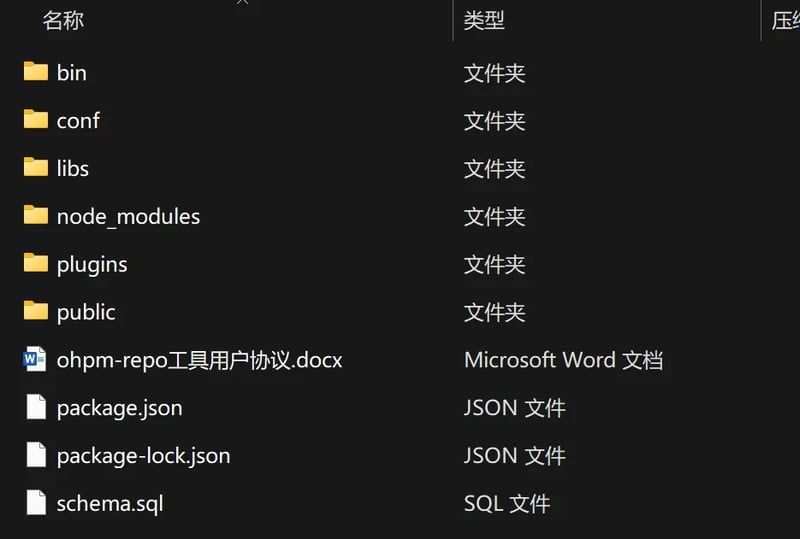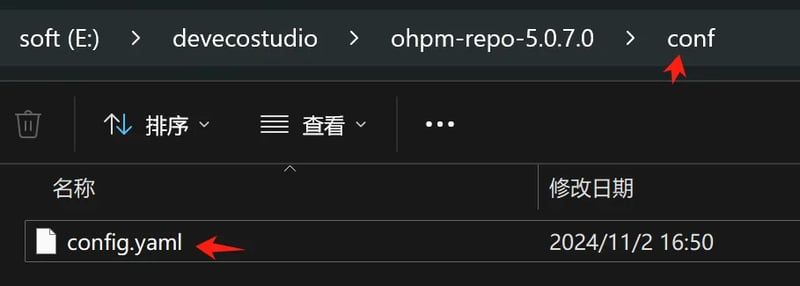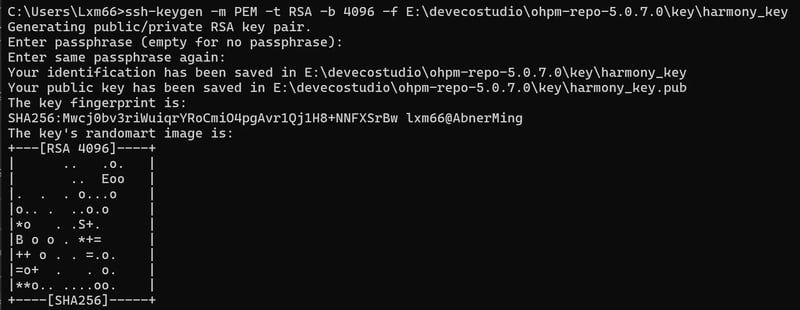Setting Up Your Own Private HarmonyOS Package Server

Setting Up Your Own Private HarmonyOS Package Server
This guide details setting up a private server for sharing HarmonyOS packages, addressing the need for secure, internal distribution of components and libraries. Unlike public repositories, a private server allows sharing of dynamic shared packages and ensures confidentiality within your organization or team. This comprehensive guide walks you through the process from setup to usage.
I. Installing and Configuring the ohpm-repo Server
1. Node.js Environment
The ohpm-repo server relies on Node.js. If you have DevEco Studio installed, Node.js should already be configured. Otherwise, download and install it from the official Node.js website: https://nodejs.org/download/release/latest/. Verify the installation by running node -v in your terminal.
2. Downloading and Installing ohpm-repo
Download the ohpm-repo package from the Huawei Developer website: https://developer.huawei.com/consumer/cn/download/ (Note: This link might need updating based on availability). Unzip the downloaded file. Add the bin directory's path to your system's PATH environment variable. Verify the installation using ohpm-repo -v.

3. IP Address Configuration
For local use, no changes are needed. For network use, modify the listen parameter in config.yaml (located in the conf directory) to use your server's IP address and port. For example:
listen: your_server_ip:8088

4. Additional Configuration Options
The config.yaml file allows configuring various aspects of the server, including the installation root directory (deploy_root) and database storage path (db.config.path).
deploy_root: '' # Installation root directory (defaults to user's home directory)
db:
type: filedb
config:
path: ./db # Local database storage path (defaults to <deploy_root>/db)5. Installation and Startup
Run ohpm-repo install followed by ohpm-repo start from the bin directory to install and start the server. The server's data will be stored in the deploy_root directory. Access the server's web interface at the configured IP address and port (default: localhost:8088). The initial login credentials are: admin/12345Qq!

II. Uploading a Static Shared Package
1. Key Configuration
Generate an SSH key pair using ssh-keygen -m PEM -t RSA -b 4096 -f <your_key_path>. This creates a public key (.pub) and a private key. Upload the public key to the ohpm-repo server's authentication management section.

Set the private key path using ohpm config set key_path <your_key_path>. Make sure the path to your ohpm executable is added to your system's PATH environment variable (usually found in the DevEco Studio installation directory under tools\ohpm\bin).

Copy your publish ID from your user profile on the ohpm-repo server and set it using ohpm config set publish_id <your_publish_id>
2. Web UI Upload
Navigate to the package management section of the ohpm-repo web interface, click "Upload Package", select your .har file, and upload. Ensure that the organization name matches the one used in your package.
3. ohpm Command-Line Upload
Set the private repository URL using:
ohpm config set publish_registry <ohpm-repo_address>/repos/ohpm
Then publish your package using ohpm publish demo.har. You will be prompted for your password.
III. Uploading Dynamic Shared Packages
Dynamic shared packages (HSP) require a different approach. They must first be built in release mode (within DevEco Studio) to generate a .tgz package. Once built, utilize the ohpm publish command (with the private registry already configured) to upload the .tgz file.
IV. ohpm-repo Web Interface Overview
The ohpm-repo web interface provides a simple, visual way to manage packages. You can view, search, and manage user accounts, repositories, and authentication settings.
V. Integrating the Private Server into Your Project
Configure your project to use the private server with:
ohpm config set registry <ohpm-repo_address>/repos/ohpm
You can then install packages from the private server using ohpm install <package_name> or by adding them to your project's oh-package.json5.
VI. Conclusion
Setting up a private ohpm-repo server offers a secure and efficient way to manage your HarmonyOS shared packages. Remember to maintain consistent organization names between your packages and the server, and consider configuring both private and public registry addresses for convenient access to all necessary packages.
Related Articles
Software Development
Unveiling the Haiku License: A Fair Code Revolution
Dive into the innovative Haiku License, a game-changer in open-source licensing that balances open access with fair compensation for developers. Learn about its features, challenges, and potential to reshape the software development landscape. Explore now!
Read MoreSoftware Development
Leetcode - 1. Two Sum
Master LeetCode's Two Sum problem! Learn two efficient JavaScript solutions: the optimal hash map approach and a practical two-pointer technique. Improve your coding skills today!
Read MoreBusiness, Software Development
The Future of Digital Credentials in 2025: Trends, Challenges, and Opportunities
Digital credentials are transforming industries in 2025! Learn about blockchain's role, industry adoption trends, privacy enhancements, and the challenges and opportunities shaping this exciting field. Discover how AI and emerging technologies are revolutionizing identity verification and workforce management. Explore the future of digital credentials today!
Read MoreSoftware Development
Unlocking the Secrets of AWS Pricing: A Comprehensive Guide
Master AWS pricing with this comprehensive guide! Learn about various pricing models, key cost factors, and practical tips for optimizing your cloud spending. Unlock significant savings and efficiently manage your AWS infrastructure.
Read MoreSoftware Development
Exploring the GNU Verbatim Copying License
Dive into the GNU Verbatim Copying License (GVCL): Understand its strengths, weaknesses, and impact on open-source collaboration. Explore its unique approach to code integrity and its relevance in today's software development landscape. Learn more!
Read MoreSoftware Development
Unveiling the FSF Unlimited License: A Fairer Future for Open Source?
Explore the FSF Unlimited License: a groundbreaking open-source license designed to balance free software distribution with fair developer compensation. Learn about its origins, strengths, limitations, and real-world impact. Discover how it addresses the challenges of open-source sustainability and innovation.
Read MoreSoftware Development
Conquer JavaScript in 2025: A Comprehensive Learning Roadmap
Master JavaScript in 2025! This comprehensive roadmap guides you through fundamental concepts, modern frameworks like React, and essential tools. Level up your skills and build amazing web applications – start learning today!
Read MoreBusiness, Software Development
Building a Successful Online Gambling Website: A Comprehensive Guide
Learn how to build a successful online gambling website. This comprehensive guide covers key considerations, technical steps, essential tools, and best practices for creating a secure and engaging platform. Start building your online gambling empire today!
Read MoreAI, Software Development
Generate Images with Google's Gemini API: A Node.js Application
Learn how to build an AI-powered image generator using Google's Gemini API and Node.js. This comprehensive guide covers setup, API integration, and best practices for creating a robust image generation service. Start building today!
Read MoreSoftware Development
Discover Ocak.co: Your Premier Online Forum
Explore Ocak.co, a vibrant online forum connecting people through shared interests. Engage in discussions, share ideas, and find answers. Join the conversation today!
Read MoreSoftware Development
Mastering URL Functions in Presto/Athena
Unlock the power of Presto/Athena's URL functions! Learn how to extract hostnames, parameters, paths, and more from URLs for efficient data analysis. Master these essential functions for web data processing today!
Read MoreSoftware Development
Introducing URL Opener: Open Multiple URLs Simultaneously
Tired of opening multiple URLs one by one? URL Opener lets you open dozens of links simultaneously with one click. Boost your productivity for SEO, web development, research, and more! Try it now!
Read More
Software Development, Business
Unlocking the Power of AWS: A Deep Dive into Amazon Web Services
Dive deep into Amazon Web Services (AWS)! This comprehensive guide explores key features, benefits, and use cases, empowering businesses of all sizes to leverage cloud computing effectively. Learn about scalability, cost-effectiveness, and global infrastructure. Start your AWS journey today!
Read MoreSoftware Development
Understanding DNS in Kubernetes with CoreDNS
Master CoreDNS in Kubernetes: This guide unravels the complexities of CoreDNS, Kubernetes's default DNS server, covering configuration, troubleshooting, and optimization for seamless cluster performance. Learn best practices and avoid common pitfalls!
Read MoreSoftware Development
EUPL 1.1: A Comprehensive Guide to Fair Open Source Licensing
Dive into the EUPL 1.1 open-source license: understand its strengths, challenges, and real-world applications for fair code. Learn how it balances freedom and developer protection. Explore now!
Read MoreSoftware Development
Erlang Public License 1.1: Open Source Protection Deep Dive
Dive deep into the Erlang Public License 1.1 (EPL 1.1), a crucial open-source license balancing collaboration and contributor protection. Learn about its strengths, challenges, and implications for developers and legal teams.
Read MoreSoftware Development
Unlocking Kerala's IT Job Market: Your Path to Data Science Success
Launch your data science career in Kerala's booming IT sector! Learn the in-demand skills to land high-paying jobs. Discover top data science courses & career paths. Enroll today!
Read More
Software Development
Automation in Software Testing: A Productivity Booster
Supercharge your software testing with automation! Learn how to boost productivity, efficiency, and accuracy using automation tools and best practices. Discover real-world examples and get started today!
Read MoreSoftware Development
Mastering Anagram Grouping in JavaScript
Master efficient anagram grouping in JavaScript! Learn two proven methods: sorting and character counting. Optimize your code for speed and explore key JavaScript concepts like charCodeAt(). Improve your algorithms today!
Read More
Software Development
Mastering Kubernetes Deployments: Rolling Updates and Scaling
Master Kubernetes Deployments for seamless updates & scaling. Learn rolling updates, autoscaling, and best practices for high availability and efficient resource use. Improve your application management today!
Read More